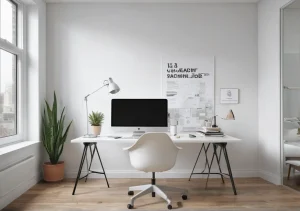Virtual technical interviews are the new frontier in hiring, blending the traditional interview experience with cutting-edge technology. As companies increasingly turn to online formats, understanding how to navigate these virtual encounters becomes essential.
To succeed in a virtual technical interview, candidates must master the technology, familiarize themselves with the problem-solving process, and rehearse their responses to common technical questions. This preparation goes far beyond just knowing the basics, as there’s a treasure trove of tactics and insights waiting to elevate your performance in these digital meetings.
Key Takeaways:
- Familiarize yourself with common virtual interview platforms like Zoom and Microsoft Teams, and troubleshoot your tech setup in advance to avoid surprises.
- Create a professional interview environment with good lighting, minimal distractions, and an organized background to convey competence and focus.
- Practice your problem-solving process aloud during technical questions, demonstrating your thought process and adaptability to engage interviewers effectively.
What technology tools should candidates be familiar with?
Understanding the technology platforms typically used for virtual interviews is crucial. Familiarize yourself with tools like Zoom, Microsoft Teams, and Google Meet. Most companies lean towards one of these, so checking which platform the company uses ahead of time can save you from last-minute surprises.
Make sure to troubleshoot basic issues beforehand. Here’s what you can do:
Test your internet connection : A stable connection is non-negotiable. Use a wired connection if possible. If you’re on Wi-Fi, try to be as close to the router as you can.
Check your audio and video : Before the interview, run a test call with a friend or family member. Adjust your settings to ensure your microphone and camera are working as they should.
Familiarize yourself with platform features : Know how to use screen sharing, mute, and chat functions. These can be especially handy if you need to present work examples or if you have questions during the interview.
Have a backup plan : Keep a secondary device nearby, like a smartphone or tablet, just in case your main system has issues.
Beyond just the functionality of tools, understanding the etiquette of virtual interviews is equally important. A simple practice run can make a significant difference in how smoothly things go on the big day.
How can one create a professional interview environment?
Your interview environment speaks volumes about your professionalism. A tidy and distraction-free space can help you stay focused and convey the right impression.
Prioritize these elements for an effective workspace:
Cleanliness : Make sure your area is clutter-free. A neat background shows you’re organized and prepared. A simple wall or bookshelf in the background works best.
Lighting : Find a spot with ample natural light or invest in a ring light to enhance visibility. Position yourself so that the light is in front of you, not behind. This way, you won’t appear shadowy or overexposed.
Noise control : A quiet spot helps keep interruptions to a minimum. If you can, do your interview in a room away from household noise. Consider using noise-canceling headphones to further eliminate distractions.
Decor : Minimal decor can add personality. Some plants or books can contribute to a welcoming atmosphere but keep it professional; avoid personal photos or distracting items.
Creating the right look can set you apart. Test your setup ahead of time; how you present yourself virtually is just as vital as your answers during the interview.
What common technical questions should candidates prepare for?
Getting familiar with frequent technical questions can really boost your confidence. Here’s a quick rundown of common questions you might encounter, particularly in coding interviews:
Data Structures: Be ready to discuss and manipulate arrays, linked lists, stacks, queues, hash tables, and trees. Questions often focus on how to use these structures effectively.
Algorithms: Expect questions on sorting algorithms (like QuickSort and MergeSort), searching algorithms (binary search), and basic algorithmic concepts (like recursion and dynamic programming).
System Design: For more experienced roles, you might be asked to design a system or a feature. Think about scalability, database choices, and architecture patterns.
Conceptual Questions: Prepare to explain fundamental concepts like OOP principles (inheritance, encapsulation) or basics of databases (SQL vs. NoSQL, normalization).
Language-Specific Features: Brush up on the language you’ll be using during the interview, including functions, error handling, or specific libraries relevant to the job.
These topics will give you a solid starting point. To really drive it home, consider practicing mock interviews. They can help you get used to the pressure and format, making you more comfortable when the real deal comes around.
How can candidates effectively demonstrate their problem-solving skills?
Your problem-solving skills are really what set you apart in a virtual technical interview. Articulating your thought process is key. Here’s how you can effectively showcase that:
Break down problems into manageable parts. As you tackle a question, narrate your approach out loud. Start by explaining the problem you’re facing, and clarify any ambiguities right away. This shows you’re thoughtful and not just jumping into coding.
When coding, use a whiteboard tool or share your screen. As you write code, explain what you’re doing step-by-step. If you hit a snag, talk through your reasoning. Don’t be afraid to backtrack or refactor your code; it demonstrates flexibility and self-awareness.
Additionally, incorporate edge cases and discuss their impact. For instance, if you’re coding a sorting algorithm, you might say, “I’ll first check whether this array is empty or already sorted.” This thought process shows awareness of real-world scenarios.
Lastly, wrap up by discussing the efficiency of your solution. Offer a time and space complexity analysis; this not only reflects your technical knowledge but also your foresight in considering performance.
Incorporating these practices will build a strong narrative around your technical skills, making your interview experience more engaging and effective.
What role does body language play in a virtual setting?
In a virtual interview, body language isn’t just important—it can make or break the impression you leave. Even though you’re behind a screen, your posture, eye contact, and gestures still matter. Leaning slightly forward shows you’re engaged and interested. A relaxed, open posture conveys confidence.
Eye contact can be tricky in virtual settings. Rather than staring at your own image or the interviewer’s face, look directly at the camera when speaking. This creates a sense of connection, as if you’re making eye contact in person.
Also, don’t underestimate the power of gestures. Hand movements can help emphasize points and make you seem more animated. Just be mindful not to overdo it; excessive movement can be distracting.
Here are some practical tips to enhance your body language during a virtual interview:
- Set the scene: Choose a clean, well-lit background. Good lighting not only presents you well but also affects your demeanor.
- Dress the part: Wear professional attire from head to toe. Even if the interviewer can only see your top half, dressing appropriately boosts your confidence level.
- Practice facial expressions: Smile and nod to show you’re actively listening. This positivity is infectious.
- Control distractions: Turn off notifications and minimize background noise. This focus shows respect for the interviewer’s time.
- Be aware of your habits: Pay attention to any nervous habits, like fidgeting or playing with your hair. Recognizing these allows you to manage them effectively.
Finally, try a quick pre-interview check-in with a friend or family member. Use this time to refine your body language and ensure you come off as the confident candidate you are.
How important is practicing with mock interviews?
Diving into mock interviews can be game-changing for your preparation. These practice runs mimic the actual experience, helping to quell those pre-interview jitters while sharpening your communication skills.
Try setting up a few scenarios with a friend or even recording yourself. Here’s how to make the most of it:
- Simulate the environment: Use the same setup you will for the actual interview. This includes your equipment, software, and even the same chair or area. Familiarity can ease anxiety.
- Focus on technical skills: If the interview includes a technical assessment, practice those skills in advance. This can include coding tests, problem-solving exercises, or whatever is relevant to your field.
- Feedback loops: After each mock session, get constructive criticism from your partner. Ask about your tone, clarity, and body language. Understanding how you come across aids improvement.
- Record and review: Consider recording your mock interviews. Watching them can reveal habits you may not notice in the moment, like speaking too fast or using filler words.
- Vary the questions: Have a mix of standard questions and some curveballs. This practice helps you think on your feet and builds adaptability, which is crucial in real interviews.
To add an extra layer, focus on timing. Practice answering questions concisely but thoroughly within a set time limit. This skill can significantly enhance your delivery during the actual interview.
Doing mock interviews isn’t just about practicing answers; it’s about building confidence and refining your overall approach.
What should candidates do if they encounter technical difficulties during the interview?
Technical glitches can be a real hassle during virtual interviews, but having a solid backup plan can keep things running smoothly. First off, make sure to test your equipment beforehand—check your internet connection, microphone, and camera. If something does go haywire during the interview, stay calm. Here’s what you can do:
Notify the interviewer immediately. Politely explain the issue without going into panic mode.
Switch to a backup device if available. Having a tablet or a smartphone handy can save the day.
Suggest a different platform. If you’re having trouble with Zoom, you might say, “Would you be okay switching to Google Meet for a moment?”
Keep communication open. If you lose connection, be proactive. Send a quick message via the interview scheduling tool or your email to keep them updated.
Practice good troubleshooting. Familiarize yourself with common issues on your preferred video platform. Knowing how to quickly troubleshoot audio or video issues can boost your confidence.
Having a few strategies in your pocket to handle these problems can make a world of difference in how you come across as a candidate.
What unique preparations can set an applicant apart?
Standing out in a sea of candidates often comes down to how well you show your personal touch and relevant experience.
Using real-life projects that relate to the job can really make an impression. For instance, if you’re applying for a software development position, think about your side projects or any open-source contributions you’ve made. Bring those up during the interview as tangible examples of your skills in action.
Don’t forget to:
Showcase your portfolio. Have a digital version ready to share, including links to the projects you’re proud of.
Prepare a brief story. Explain the challenges you faced, how you solved them, and what you learned. Keeping it concise yet impactful can engage your interviewer.
Tailor your narrative. Connect your experiences directly to the role you’re applying for. If it aligns with the company’s values or mission, emphasize that point.
Follow up with extras. Send a thank-you email that includes links to your projects mentioned in the interview. It reaffirms your enthusiasm and provides easy access for them to revisit.
Lastly, remember to infuse your personality into your responses. Employers appreciate authenticity and enthusiasm, so don’t shy away from letting your unique self shine through. That little touch can be what they remember most when making their choice.
Are there any interesting statistics about virtual interviews?
Virtual interviews are becoming a game changer in hiring. A recent study noted that nearly 80% of companies now use video interviews as part of their recruitment process. This shift has driven candidates to adapt their strategies and expectations.
Candidate preferences are telling. In a survey, over 70% of job seekers expressed a strong preference for virtual interviews, appreciating the flexibility they offer. With remote work on the rise, candidates find it easier to manage their schedules and reduce travel time, creating a win-win situation for both sides.
Employers value assessment tools. Research highlights that employers focus on technical skills and cultural fit during virtual interviews. They often use standardized tests and coding challenges, which can mean a more objective evaluation compared to traditional methods. In fact, 67% of recruiters indicated that virtual interviews allow for a better assessment of a candidate’s skills in technical roles.
Engagement plays a crucial role. Statistics show that candidates who ask questions during their virtual interviews tend to leave a more positive impression. About 60% of hiring managers appreciate when candidates demonstrate curiosity about the company and role. This engagement signals a genuine interest, which can be a deciding factor.
Connection quality matters. A stable internet connection is essential. Studies report that poor connection quality can lead to negative perceptions of candidates, with over 50% of interviewers noting that tech issues affect their view of a candidate’s professionalism. Therefore, testing your setup beforehand can make a real difference.
For best results, practice makes perfect. Familiarize yourself with the virtual platform being used for the interview. Mock interviews can help build confidence and ensure you’re comfortable with the technology. Plus, it’s wise to have a backup plan ready—just in case technology decides not to cooperate.
Staying informed and prepared can help you not just meet but exceed expectations in virtual technical interviews. Don’t underestimate the power of preparation!




